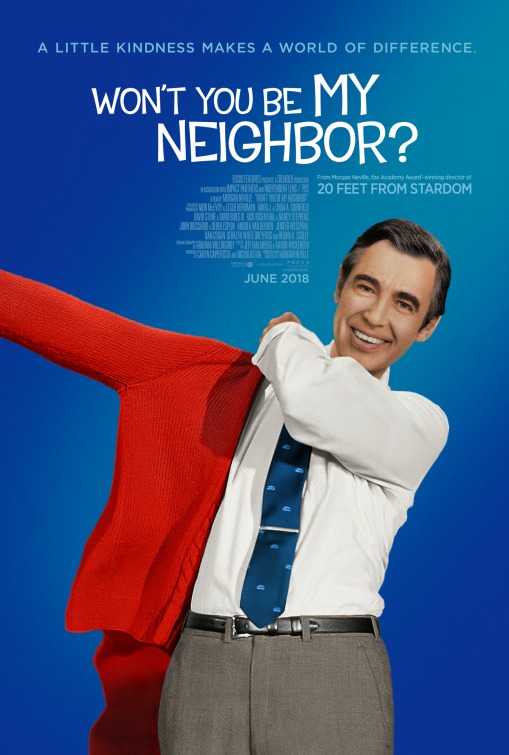Won’t You Be My Neighbor?
Posted on July 29, 2018 by John Elrod II in Featured, Reviews // 1 Comment
Over the course of 33 years, comprised of 31 seasons, Fred Rogers began some 900 episodes of his series Mister Rogers’ Neighborhood asking-no, singing-a very simple question: Won’t you be my neighbor? Fifteen years after his death, this documentary borrows Rogers’ question and doesn’t seem to be asking as much as it’s begging its audience to please say yes.
Won’t You Be My Neighbor?, from Academy Award-winning documentarian Morgan Neville (20 Feet from Stardom) spends its 93 minutes exploring much of Fred Rogers’ life, a large percentage of which saw him perform as “Mister Rogers” for several generations of children. I say “perform”, but as the documentary goes to great length to establish, Fred Rogers was the same person off-camera as he was on it. He spent a lifetime being himself, and it made him an icon for millions of people desperate for any validation in their attempts to be themselves. Won’t You Be My Neighbor? succeeds in giving us all what we want: the deification of Fred Rogers.
If it stopped there, this documentary would have been roundly applauded as a warm tribute to a beloved figure. There would be no complaints, least of all from me. After all, I grew up watching Mister Rogers’ Neighborhood with my grandparents, and getting an hour-and-a-half-long indulgence of my nostalgia would have been just fine with me. This documentary doesn’t just give us what we want, though. No, it also gives us what we need, and that is what elevates Won’t You Be My Neighbor? beyond the sentimental paean it could have been.
We didn’t need to be told Fred Rogers was godly or even all that unique; what we needed was for Fred Rogers to be human. Yes, much of Won’t You Be My Neighbor? talks of the successes of Rogers’ life, but success is a mountaintop whose view can never be appreciated if you ignore life below the clouds. This documentary acknowledges the failures of Fred Rogers’ life, and it gives room to the fears he felt despite objective success.
“‘Won’t you be my neighbor?’ Well, I suppose it’s an invitation. It’s an invitation for somebody to be close to you.” – Fred Rogers
Toward the end of his life, and this is something the documentary addresses, it was suggested by some that Fred Rogers’ insistence that all children are special had somehow created an entitled generation who couldn’t handle failure. This is an absurd claim, of course, and the documentary does a good job of directly refuting it, but the most effective rebuttal this documentary provides is indirect; it’s simply in the fact that we’re shown the imperfections of Fred Rogers. He was special; not because he was perfect, but because he was himself, and he encouraged us to accept ourselves and each other. That was the point.
If you are someone, like me, who grew up watching Mister Rogers’ Neighborhood, you are lucky to have gotten that encouragement. As a child, there is no greater lesson to learn than that of self-worth. If you learn to love yourself, loving others becomes easier; accepting others for who they are becomes easier. We don’t have Fred Rogers right now, though. We have Donald Trump, and we have his rhetoric that seeks to encourage division and hatred. Everything about Donald Trump and his presidency of questionable legitimacy is about building walls; a literal one, of course, but also so many figurative ones.
And it’s obviously not just Donald Trump; it’s what he represents. We like to believe we’re in the death throes of things like racism or sexism, and Trump’s rise to power is just one last grasp of a dying time, but maybe it’s not. It’s easy to let that fear creep in; to think we have failed. Maybe Trump is just the world being itself. Once you get into this mindset, it can be difficult to find your way out. Hope is an elusive creature hiding behind every fear. In these trying times, and they sure are trying, giving up seems alluring, but then you watch a documentary. And, for 93 minutes, everything feels okay. It’s not a window into perfection, or a visit to the often exalted “good old days”, but it is a hand reaching out to help you up when you’re down; you just have to answer one question.
Won’t You Be My Neighbor? Review Score
-
Directing – 9.5/109.5/10
-
Editing – 9.5/109.5/10
-
Interviews – 10/1010/10
-
Archive Footage – 10/1010/10
"Won't You Be My Neighbor?"
Fred Rogers, Joanne Rogers, McColm Cephas Jr., François Scarborough Clemmons, Kailyn Davis, Yo-Yo Ma, Joe Negri, David Newell | Cinematographer: Graham Willoughby | Editor: Jeff Malmberg and Aaron Wickenden | Music: Jonathan Kirkscey | Director: Morgan Neville


Just reading this review made me teary eyed ?